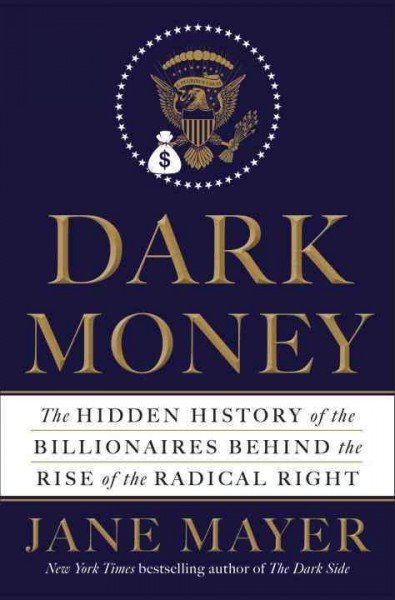How Dark Money Affects Political Outcomes
- Wednesday, 23 March 2016 19:11
- Last Updated: Tuesday, 29 March 2016 22:52
- Published: Wednesday, 23 March 2016 19:11
- Joanne Wallenstein
- Hits: 4335
 What happens to democracy when the public can't "follow the money" in elections? The community will have a chance to ponder this and other questions about so-called "dark money" now flooding into U.S. political campaigns at an upcoming jointly sponsored League of Women Voters – Scarsdale Public Library event.
What happens to democracy when the public can't "follow the money" in elections? The community will have a chance to ponder this and other questions about so-called "dark money" now flooding into U.S. political campaigns at an upcoming jointly sponsored League of Women Voters – Scarsdale Public Library event.
On Thursday, April 7th at 1 pm in the Scott Room of the Scarsdale Public Library, librarian Nancy Zachary will facilitate the discussion of journalist Jane Mayer's new book, Dark Money: The Hidden History of the Billionaires Behind the Rise of the Radical Right (Doubleday 2016). The Library has copies of Mayer's book available for borrowing and registration is free and open to the public on the Library's website or by clicking here.
What is "dark money" and should voters be concerned about it? Federal campaign finance law requires political candidates to identify all Political Action Committees (PACs) and party committees that contribute directly to a candidate's campaign, and each individual who contributes more than $200 to a campaign in an election cycle. However, "dark money", contributions to tax-exempt nonprofit corporations, such as 501(c)(4) "social welfare" organizations, many of which exist solely to influence election outcomes, is not subject to spending limits or disclosure requirements so long as the organizations do not coordinate directly with a candidate.
The proliferation of 501(c)(4) "social welfare" organizations and sharp rise in "dark money" spending in recent elections followed the U.S. Supreme Court's 2010 Citizens United decision, which overturned a century of U.S. campaign finance legislation and now allows all corporations, nonprofit "social welfare" organizations, and unions to spend unlimited money from their general treasuries indirectly supporting political campaigns.
Since Citizens United, the number of groups applying for 501(c)(4) status has more than doubled and the money they are spending on politics has "skyrocketed," according to the nonpartisan Center for Responsive Politics. They estimate that in the 2012 election, 501(c)(4) groups spent at least $333 million, an increase of 53 percent from 2008. And this year's election is expected to set a new record for secret donations. Already, on January 28, 2016, Bloomberg news reported: "Groups that don't have to disclose their donors have accounted for almost two-thirds of political ad spending this [election] cycle."
In Dark Money, Jane Mayer focuses specifically on a relatively small number of wealthy individuals -- the Koch brothers, the Olins, the Scaifes, the Bradleys and others – who have funneled millions of dollars in donations through "social welfare" groups to influence elections while avoiding public scrutiny. But Mayer's investigation goes beyond campaign finance to document such billionaires' comprehensive plans, simultaneous funding publications, think tanks, academic fellowships and university research centers, which, she argues, have played an equally pivotal role in furthering their political goals, as well as their business interests.
The New York Review of Books (March 10, 2016) calls Dark Money "absolutely necessary reading for anyone who wants to make sense of our politics." Whether or not you agree, come join what is sure to be a lively discussion on April 7th.
This article was submitted by Mary Beth Evans, Chair, Money in Politics Committee and Deb Morel, President of the League of Women Voters of Scarsdale.